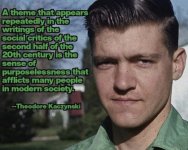Suffering is the natural human condition. We seem to have forgotten that to our detriment and it’s a reason we are dying as a culture and society. Then our children and our children’s children will know what real suffering is like.
Couple this with repeat studies indicating happiness thrives in what we would call destitute conditions whereas here, where we have all the comforts, maladies of contentment abound.
I prefer the Taoist ideas about suffering over Catholic.
The Master sees things as they are,
without trying to control them.
She lets them go their own way,
and resides at the center of the circle.
When reading about Buddhism, an author (Brad Warner) pointed out that the word in Hindi for suffering is Duhkha, and it is translated (from wiki)
meaning anything that is "uneasy, uncomfortable, unpleasant, difficult, causing pain or sadness".[9][10] It is also a concept in Indian religions about the nature of life that innately includes the "unpleasant", "suffering", "pain", "sorrow", "distress", "grief" or "misery."[9][10] The term duḥkha does not have a one-word English translation, and embodies diverse aspects of unpleasant human experiences.[3][10] It is opposed to the word sukha, meaning "happiness," "comfort" or "ease.
In a way, we could translate this to any sort of unpleasantness that one encounters in life. We strive to be at sukha as a species. There's a lot to unpack when we talk about suffering in the modern world. Our bodies were made for running, swimming, hunting, climbing and walking. Anthropologically speaking, we are middling on the food chain and were incorporated into our natural environments as such. We realized that cooperation kept us alive and fed better than being solitary and thus society was created. We learned to cook our food, which made us able to eat and extract nutrients faster than our other primate cousins, which began changing the shape of our skulls, to what they are now. We, eventually, form complex emotional and societal bonds and felt the need to leave the natural world and all it's predators behind. We just wanted to not be eaten, nor did we want anyone that we cared about to be eaten.
When we decided that human lives were more important than a natural balance of predator and prey, we changed a lot of things, not just for the earth, but for us humans. There is anthropological evidence that humans had a much better sense of smell and hearing in our hunter gatherer days. We have lost this over centuries because we haven't needed it. As we continually enhance the mind, we forget to ask, "what world was my mind created for?" Our minds are just animal brains and we are happiest doing animalistic things like walking in nature, making things, and hunting and gathering. I won't say that our comforts are what bring us our maladies per se, but that we used our minds to create things that make tasks easier--things like how do we feed everyone, clothe everyone and shelter everyone--but because our minds are no longer doing what they were intended and designed to do, we get neuroses. Study after study talks about how humans need sunlight, and down time, and social connections and storytelling and plants and all the other things we find in nature, and were we hunting and gathering, we would get plenty of this sort of stuff. But when we set our minds to eliminating suffering or even just inconveniences, like everything else in this world, it comes with a trade off. And those trade offs are often seen in society's mental health. A dysfunction in "being able to cope" with the world comes when the world that we created leaves us isolated and unhappy. I think this is the most insidious thing about our modern world, the lack of true community connection because everyone is "in it for themselves" which is a fundamentally un-sapien-like way of thinking--and does cause us harm as individuals. We evolved to depend on each other. Yanking that away, even if it took 100 years, was way too short of a time for us to adapt to isolation in the modern world.
We have not forgot how to suffer. We know how to because we do it every day. What we are losing is connection to other people and to our natural world--the world our minds and bodies adapted to live in. To quote Stephen King, "We have forgotten the face of our fathers." When we are no longer able to work cooperatively, we become agents of destruction.

